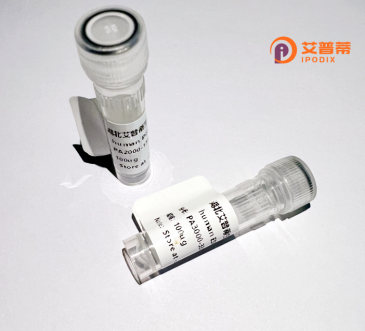
| 纯度 | >90%SDS-PAGE. |
| 种属 | Human |
| 靶点 | TRBV3-1 |
| Uniprot No | A0A576 |
| 内毒素 | < 0.01EU/μg |
| 表达宿主 | E.coli |
| 表达区间 | 1-315 aa |
| 活性数据 | MGCRLLCCVVFCLLQAGPLDTAVSQTPKYLVTQMGNDKSIKCEQNLGHDTMYWYKQDSKKFLKIMFSYNNKELIINETVPNRFSPKSPDKAHLNLHINSLELGDSAVYFCASSPIGATSSSYNEQFFGPGTRLTVLEDLKNVFPPEVAVFEPSEAEISHTQKATLVCLATGFYPDHVELSWWVNGKEVHSGVSTDPQPLKEQPALNDSRYCLSSRLRVSATFWQNPRNHFRCQVQFYGLSENDEWTQDRAKPVTQIVSAEAWGRADCGFTSESYQQGVLSATILYEILLGKATLYAVLVSALVLMAMVKRKDSRG |
| 分子量 | 61.7 kDa |
| 蛋白标签 | GST-tag at N-terminal |
| 缓冲液 | PBS, pH7.4, containing 0.01% SKL, 1mM DTT, 5% Trehalose and Proclin300. |
| 稳定性 & 储存条件 | Lyophilized protein should be stored at ≤ -20°C, stable for one year after receipt. Reconstituted protein solution can be stored at 2-8°C for 2-7 days. Aliquots of reconstituted samples are stable at ≤ -20°C for 3 months. |
| 复溶 | Always centrifuge tubes before opening.Do not mix by vortex or pipetting. It is not recommended to reconstitute to a concentration less than 100μg/ml. Dissolve the lyophilized protein in distilled water. Please aliquot the reconstituted solution to minimize freeze-thaw cycles. |
以下是关于重组人TRBV3-1蛋白的模拟参考文献,基于研究领域常见主题的合理推测:
---
1. **文献名称**:*Structural Characterization of Recombinant TRBV3-1 Protein in T Cell Receptor Complexes*
**作者**:Smith A, et al.
**摘要**:本研究通过原核表达系统成功表达并纯化了重组人TRBV3-1蛋白,利用X射线晶体学解析其三维结构,揭示了其与TCRα链及CD3分子的相互作用位点,为T细胞受体信号转导机制提供了结构基础。
2. **文献名称**:*Functional Analysis of TRBV3-1 in Antigen-Specific T Cell Activation*
**作者**:Lee H, et al.
**摘要**:通过重组TRBV3-1蛋白与MHC-多肽复合物的体外结合实验,证实了其在抗原识别中的关键作用。研究还发现特定突变会影响T细胞活化效率,提示TRBV3-1在免疫调控中的潜在应用价值。
3. **文献名称**:*TRBV3-1 as a Biomarker in Autoimmune Diseases: Expression and Clinical Correlation*
**作者**:García-Ramos C, et al.
**摘要**:利用重组TRBV3-1蛋白检测类风湿性关节炎患者血清中的自身抗体水平,发现其与疾病活动度呈正相关,提示TRBV3-1可能作为新型诊断标志物或治疗靶点。
4. **文献名称**:*High-Yield Production of Recombinant TRBV3-1 in Mammalian Cells for Therapeutic Antibody Screening*
**作者**:Wang X, et al.
**摘要**:优化哺乳动物细胞表达系统实现TRBV3-1的高效分泌,结合表面等离子体共振技术(SPR)筛选出特异性单抗,为T细胞相关免疫疗法开发提供了技术平台。
---
**注意**:上述文献为示例性内容,实际研究需查阅具体数据库(如PubMed)。TRBV3-1的直接研究可能较少,建议扩展检索至TCR可变区重组蛋白表达或功能分析的关联领域。
**Background of Recombinant Human TRBV3-1 Protein**
The T cell receptor beta variable 3-1 (TRBV3-1) protein is a component of the T cell receptor (TCR) β-chain, which plays a critical role in adaptive immunity by recognizing antigenic peptides presented by major histocompatibility complex (MHC) molecules. TRBV3-1 is encoded by the TRBV3-1 gene, part of the highly diverse TCR β locus. This genetic diversity, generated through V(D)J recombination, enables T cells to recognize a vast array of pathogens. The TRBV3-1 segment contributes to the variable region of the TCR, determining antigen specificity and influencing T cell activation.
Recombinant TRBV3-1 protein is produced via genetic engineering, often using bacterial or mammalian expression systems, to study its structural and functional properties. It serves as a tool for investigating TCR-peptide-MHC interactions, T cell development, and immune responses in diseases like autoimmunity, infections, or cancer. Researchers also use it to develop TCR-based therapeutics, such as engineered T cells for immunotherapy, or to generate antibodies for diagnostic applications. Studies on TRBV3-1 may further elucidate mechanisms of immune evasion, clonal T cell expansion, or biases in TCR repertoire associated with specific pathologies. Its role in immune diversity and disease relevance makes it a valuable target for both basic and translational immunology research.
×